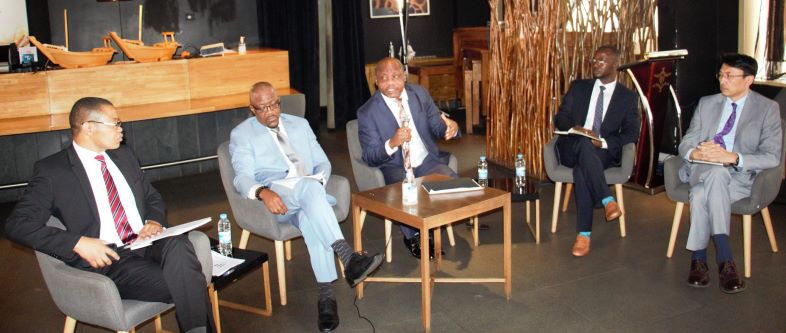PHOTO: Panelists discussing findings of the Liberia Economic Update
By Alfred Kollie, alfredkolliejr92@gmail.com
A World Bank report on Liberia released over the weekend says extreme poverty remains high in Liberia despite inflation and economic activities in the Country.
Since they came to power close to four years ago, the CDC government has boasted of tremendous efforts towards drastically reducing poverty, and had claimed that this government has done more than any other past government in just three years.
Last Thursday, November 18, 2021, President George M. Weah through his Finance Minister Samuel Tweah submitted to the Legislature a draft budget for 2022 in the tone of US$785M, the highest in post-war Liberia.
A day later on Friday, November 219, 2021, the World Bank Liberia office released a report indicating that Liberia is expected to experience a high level of poverty in the coming year.
Over the weekend, the World Bank launched the second edition of the annual Liberia Economic update on finding fiscal space with economic growth expected to recover to 3.6 percent in 2021 before gradually increasing to an average of 5.2% over 2022 to 2025.
Speaking at the launch of the second edition of the annual Liberia Economic update on finding fiscal space in Monrovia, World Bank Economist, Gweh Gaye Tarwo noted that poverty level is expected to increase about 52% as compared to last year.
World Bank Liberia Economist Gweh Gaye Tarwo during the launch noted that food insecurity remains key attention by the government.
‘’There is a serious food insecurity in Liberia at the moment about 81% were worried about finding food in the country based on the survey conducted in Liberia’’ Mr. Tarwo noted.
According to this new economic report, the government also needs first and foremost to reduce the very high level of recurrent spending and strengthen domestic revenue mobilization to generate savings for public investment financing.
‘’In addition , Liberia needs to invest in its people and institutions and create an educated, skilled, and healthy labor force in both the public or private sectors and protect its economy and vulnerable population against repeated exogenous shocks’’, the Liberia economic update emphasized.
Having reached a peak of 31.3percent in 2019, inflation declined significantly in 2020 and 2021 and is now down to single digit largely due to strong macroeconomic policies. The drop in World oil prices in 2020 allowed some easing in Liberia fuel prices, a frequent driver of inflationary pressures, although their decline was moderated by the introduction of excise tax early in the year.
Speaking at the launch, World Bank Country Manager for Liberia Khwima Nthara noted that the recent efforts to reduce duty waivers and the successful implementation of the pay and payroll reform are steps in the right direction and need to be complemented by actions to improve the efficiency in the consumption of goods and services by the government.
Mr. Nthara explained that after successfully stabilizing the macroeconomy, there is a need for the government to create enough fiscal space to finance the country’s massive investment needs in physical infrastructure including power or energy, roads, rails, ports and airports.
‘’The government must be commended for making tough policy choices that have resulted in this positive turnaround in macroeconomic fundamentals, especially under a challenging COVID-19. The focus now should be on complementing the improved macroeconomic environment with critical structural and governance reforms that will help boost domestic and foreign investment to create more jobs,’’ World Bank Country Manager for Liberia Khwima Nthara said.
For his Finance and Development Planning Minister Samuel Tweah Jr. commended the World Bank for the report and promised to continue to work with the Work Bank and improve government activities in all sectors.

